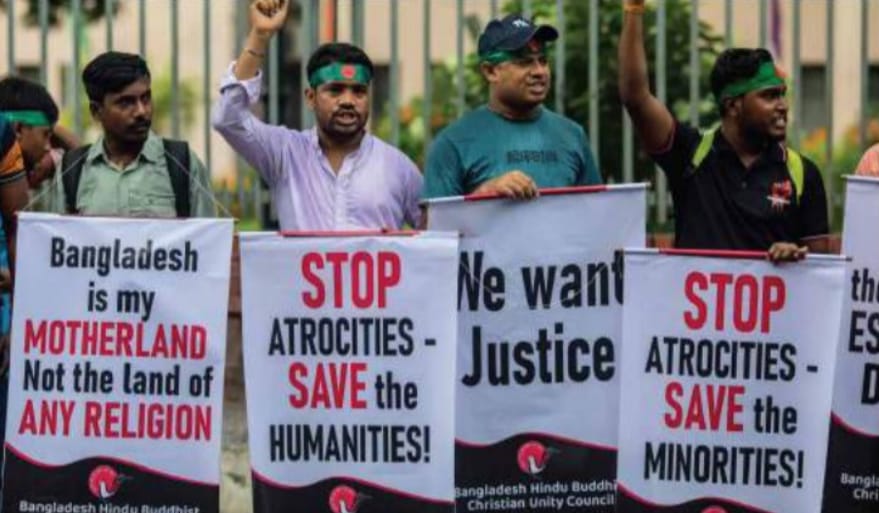Historically, communal harmony has been a foundation of Bangladesh society, where diverse religious and ethnic communities have coexisted for centuries. Despite being a Muslim-majority nation, the principles of tolerance and respect have allowed Hindus, Buddhists, Christians, and Muslims to live together largely peacefully. However, recent developments have brought significant concerns to the forefront, particularly as the interim government, born from a student-led anti-discrimination movement, seeks to navigate a landscape marred by years of misrule, corruption, injustice and social unrest. The demands for Hindu rights have emerged as a critical issue, raising questions about their legitimacy and the underlying motives driving this activism.
Minority Rights in Bangladesh
Bangladesh is characterized by a richly diverse society, home to multiple religions, ethnic groups, and languages. Minorities in this context refer to communities that are numerically smaller than the dominant Muslim population and are often distinguished by their religious, linguistic, or cultural attributes. The Hindu community, the second largest minority, constitutes about 10% of the population. That said, the Bangladeshi Constitution guarantees equal rights and religious freedoms to all minority groups, particularly the Hindus. Their resurgence in activism prompts an examination of both the historical context and the current socio-political dynamics that have led to this moment.
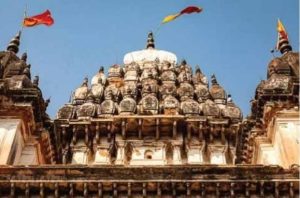
Failure of the Previous Awami League Government
Under the Awami League government, which ruled for over about two decades, the issue of minority rights was largely neglected. Despite numerous incidents of violence and discrimination against the Hindu community, the government failed to take meaningful action to address these grievances. For instance, the infamous murder of Bishwajit, a young Hindu boy, in 2012 exemplified the government’s indifference to minority safety. He was brutally attacked by members of the ruling party’s student wing, in an incident that was broadcast live on television, highlighting the extreme vulnerability of minority communities under the regime. Despite public outrage, justice meted out was slow, and only a few perpetrators were held accountable, sending a clear message of impunity.
Additionally, reports of land grabbing, forced conversions—I don’t think this happens from the majority Muslim society of broader Bangladesh—government’s failure to implement protective laws for minorities or to use the minority card for political use tend to compound these issue. Instead, there were reports of state-sponsored oppression where minority voices were silenced, contributing to a culture of fear and helplessness. There is, definitely, a possibility of local level-euphemistically called ‘village politics’– politics impinging on the issue.
The Role of Social Media in Spreading Rumors
In recent times, social media has played a dual role in shaping narratives around Hindu rights in Bangladesh. False posts claiming rampant oppression of Hindus circulated widely, predominantly and sadly from accounts linked to India. Fact-checkers confirmed that while some misinformation originated externally, there were also internal sources spreading rumors, potentially to incite violence or unrest. In several cases, attacks on properties linked to the ruling party were falsely attributed to religious motivations, masking the political undercurrents at play.
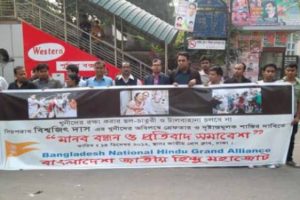
These manipulated narratives serve to distract from the systemic issues, if any, facing the Hindu community and obscure the reality of their struggles, reinforcing the idea that the previous government prioritized political gain over genuine concern for minority rights.
Current Context of the Movement: Genuine Claims or Political Manipulation?
The ongoing movement advocating for Hindu rights has ignited intense debates within the political domain of Bangladesh. With the interim government undertaking social reforms and gearing up for elections, the timing of this resurgence raises eyebrows. Critics argue that some elements within the movement might be leveraging Hindu issues for political gain, exploiting the community’s grievances to destabilize the current administration.
Analysts point out that during the tenure of the Awami League, when Hindu rights were seldom discussed, the lack of significant protest suggests that the recent surge in activism might be opportunistic rather than a spontaneous call for justice. I would not, in any way, rule out the possibility of local level politics that may involve also land or property grabbing. The sudden urgency of these demands amid a changing political landscape has led many to suspect that external influences and political agendas are at play.

Intent of the Movement: Genuine Need or Political Agenda?
There is a growing sentiment among many that the rights and security of the Hindu community are essential issues that deserve urgent attention. If the movement is genuinely aimed at securing these rights, it could pave the way for positive societal changes. However, experts caution that if the underlying motives are politically driven, it could threaten the very fabric of communal harmony in Bangladesh. I would once again reiterate Bangladesh has been a land communal harmony for ages together.
Many fear that the instrumentalization of Hindu rights for political purposes could lead to further polarization and unrest. True advocacy must be rooted in a genuine desire to address historical injustices rather than simply a means to gain political leverage.
Public Reaction and National Integration
Public reactions to the movement for Hindu rights have been mixed. Some view it as a reaction to perceived Indian interference, suggesting that the timing coincides with attempts to undermine Bangladesh’s internal stability. This suspicion is amplified by the context of the new interim government taking office, leading to questions about the motivations behind the movement.
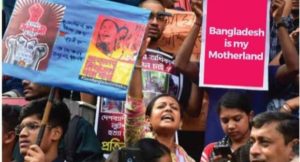
Many experts have warned that the timing of this activism coinciding with upcoming elections could incite further instability. They emphasize the need for a delicate balance between addressing minority grievances and maintaining national integration. Any deficiency, as such, can be better addressed once a more stable political environment is established. It may take time but this nation is definitely moving towards that direction. After a revolution, it takes some time for the dusts to settle down.
Possibility of Political Manipulation and Future of the Movement
The possibility of political manipulation behind the current movement cannot be entirely dismissed. Throughout Bangladesh’s political history, issues concerning minorities have occasionally been utilized for political advantage. The previous government’s negligence in addressing these issues has allowed for the current climate of dissent to flourish.
Experts argue that if this movement is shaped by genuine intentions , it could lead to significant advancements in social justice and minority rights. Conversely, if it becomes a tool for political machinations, it may result in confusion and unrest, further complicating the already volatile socio-political landscape.
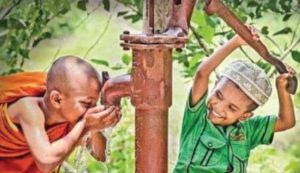
To truly secure the rights and safety of minority communities, long-term strategies are necessary, ideally pursued under a democratically elected government. Establishing meaningful dialogues, creating protective laws, and fostering inclusive policies are essential steps toward ensuring that the rights of all citizens, including Hindus, are strictly upheld in Bangladesh. At strategic level, there is no problem at all in Bangladesh society. At tactical level, there is need for better socialization and ensuring punishment to the perpetrators, as per law of the land. Rule of law is a great panacea to this social fissure.
Written by-
Prof. Dr. Mohd. Aminul Karim
Former Commandant, National Defense College, Bangladesh
Former Visiting Professor, University of Malaya, Kuala Lumpur

